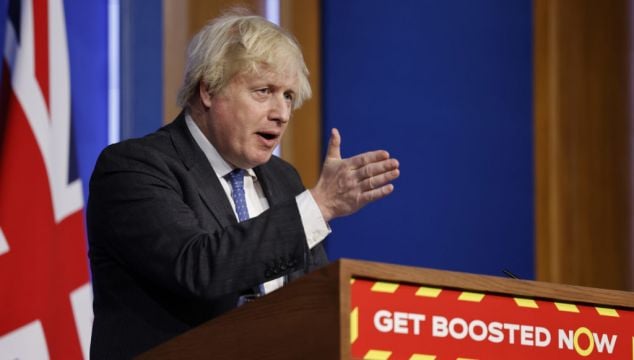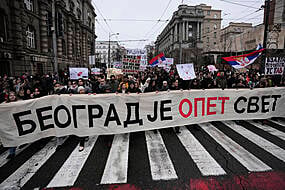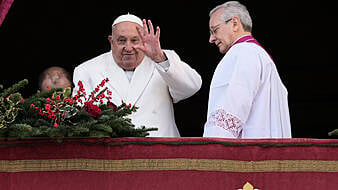British prime minister Boris Johnson has been urged to outline his post-Christmas Covid strategy, as Wales became the latest part of the UK to outline a tightening of restrictions.
Mr Johnson has reassured people that no further curbs will be introduced in England before December 25th, given there is not enough evidence on the severity of the Omicron variant and hospital admission to justify stricter measures.
With the situation constantly being reviewed, British health secretary Sajid Javid advised everyone to “remain cautious” while his ministerial colleague Gillian Keegan warned there is “uncertainty” around people making New Year's Eve plans.
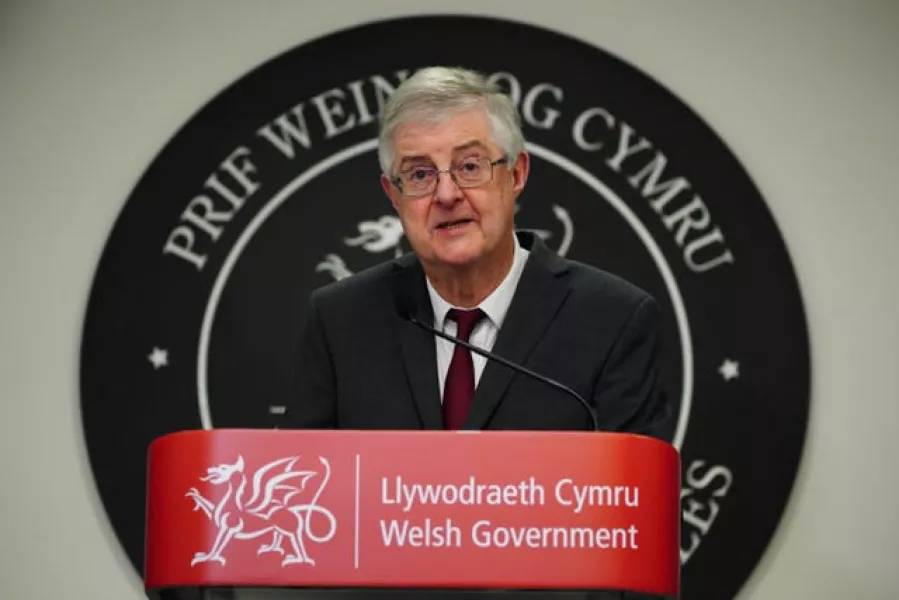
But in Wales, first minister Mark Drakeford has announced new measures to be introduced from 6am on December 26th and claimed Mr Johnson and his cabinet are “paralysed by their internal divisions”.
Elsewhere, a new formulation of the Pfizer/BioNTech Covid vaccine has been approved for use in children aged 5-11.
The UK's Joint Committee on Vaccination and Immunisation (JCVI) is advising that children aged 5-11, who are in a clinical risk group, or who are a household contact of someone (of any age) who is immunosuppressed, should be offered a primary course of vaccination.
New figures also show a record 968,665 booster and third doses of Covid-19 vaccine were also reported in the UK on Tuesday.
In Wales, the new measures were unveiled at a press conference from Mr Drakeford.
The new measures include: two-metre social distancing in all premises open to the public and workplaces, where reasonable; the rule of six applying to gatherings in regulated premises, such as hospitality, cinemas and theatres; table service in licensed premises; face coverings in hospitality settings at all times apart from when seated; and a maximum number of 30 people at an indoor event and 50 outdoors.
There will be an exception for team sports, where up to 50 spectators will be able to gather in addition to those taking part.

England is now left as an outlier when it comes to post-Christmas restrictions given the North's executive will also decide on Wednesday what “level of asks” will be made of the public to curb the latest surge in Covid-19.
In Scotland, first minister Nicola Sturgeon has already introduced new curbs on hospitality while live sports will be “effectively spectator-free” for three weeks from December 26th.
Mr Drakeford criticised what he called the UK government’s inaction over rising Omicron cases, saying: “I believe the UK government sees all the data we see and gets all the advice that we get about the need to act and act urgently in the light of the Omicron wave coming our way.”
He added: “They are paralysed by their internal divisions and are unable to act on it.”
Mr Drakeford went on: “I heard the prime minister earlier this week in an interview say the position had never been more urgent. And asked what he was going to do about it, he said that he was doing nothing. Well, that would not be acceptable to me.”
But Ms Keegan earlier said she believed the UK government’s approach was “better”, although acknowledged different parts of the country had adopted different plans during the pandemic.

She told Times Radio: “I think we’re taking a better approach personally, but of course the devolved administrations, everybody looks at their risk, everybody will take their own opinions.”
Ms Keegan, asked on LBC about going ahead with a gathering or party on December 31st, said: “There is uncertainty. We can’t predict what the data is going to tell us before we’ve got the data.”
She said the uncertainty in the data is “particularly” around severity.
Labour pressed for decisions to be made as soon as possible.
Shadow work and pensions secretary Jon Ashworth told Sky News: “Businesses have got to make decisions about what stock to get in in the run-up to New Year's Eve, so I think it would be reasonable for the government to produce a road map, if you like, a plan of what they think may well be anticipated in terms of further restrictions post-Christmas so people know where we stand.”
Elsewhere, it was reported that UK government scientists are set to conclude that Omicron is causing a milder disease than the Delta strain in most Britons.
Politico’s London Playbook said the UK Health Security Agency is expected to publish early real-world data on the disease’s severity before Christmas, with its findings also suggesting Omicron is not necessarily mild enough to avoid large numbers of hospital admissions.
Mr Javid told broadcasters: “There is analysis taking place, that analysis is not complete but I do look forward to receiving it.”

The British government has also announced the self-isolation period for vaccinated and unvaccinated people who test positive for Covid has been cut to a week, which will give more people the chance to spend time with loved ones over Christmas.
From Wednesday, those in England who receive negative lateral flow results on day six and day seven of their self-isolation period will no longer have to self-isolate for the full 10 days.
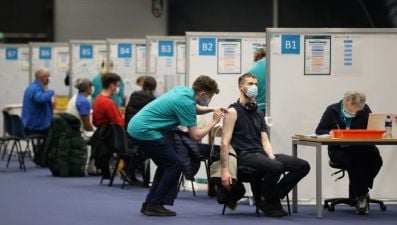
But those who are unvaccinated close contacts of positive cases must still isolate for 10 days, the UKHSA later clarified.
Figures from NHS England show that 1,904 people were in hospital in London with Covid-19 as of December 21st, the highest number since March 2nd, up 41 per cent from a week earlier.
Across England, 6,902 patients were in hospital with Covid-19 on December 21st – the highest number since November 10th, up 7 per cent week-on-week.
